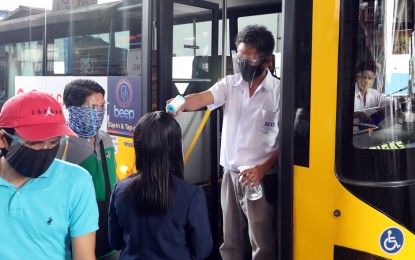
FREE BEEP CARDS. Passengers undergo a temperature check before boarding a bus in this file photo. AF Payments, Inc., the provider of contactless electronic payment system beep cards, has committed to giving 125,000 free cards to Edsa Busway commuters. (PNA photo by Joey Razon)
MANILA – AF Payments, Inc. (AFPI), the provider of contactless electronic payment system beep cards, has committed to giving 125,000 free cards to Edsa Busway commuters.
In a statement Monday evening, the Department of Transportation (DOTr) welcomed AFPI's move and thanked the firm for "seeing the light at the end of the tunnel".
"We thank AFPI for seeing the light at the end of the tunnel, and for considering the plight of our commuters who have just started to rebuild back their lives after a series of strict quarantine measures that put pressure both on their social lives and livelihoods. For them, every centavo counts," the statement read.
The decision of AFPI to provide free cards came after the mandatory use of beep cards for the Edsa Busway had been suspended for at least five days.
The “no beep card, no ride” policy for buses along Edsa, which began Thursday, was temporarily suspended until the issue with the pricing for beep cards is resolved. Edsa Busway passengers may choose to use a beep card to pay inside the bus or to pay with cash before boarding.
"We appreciate the plan of AFPI to set aside the prospect of profit for the meantime, to answer the call of need from our commuters and to give them free beep cards until a QR-based electronic ticketing system becomes operational," the statement read.
The department noted that discussions on the 2015 public-private partnership program that replaced the old magnetic card-based ticketing system in the three light railway lines in Metro Manila with the beep card would be reserved "at a later date".
"Let us first focus on our goal to make the commuting experience of passengers on the Edsa Busway convenient and affordable, in the light of compassion," it said.
The use of a QR code-based electronic ticketing system on the Edsa Busway has been one of the options for cashless transactions, it added.
"In fact, we have considered the use of this long before the outbreak of the pandemic. We believe that this will not be as tedious to implement on the Edsa Busway, as the facilities and the know-how for it is readily available," it said.
Through a smartphone app or online, passengers can buy virtual tickets, and being a contactless technology, they are assured of safer transactions needed to prevent transmission of the coronavirus.
The use of QR code technology in the automated ticketing and fare collection at the Philippine Ports Authority "should be more than enough to prove" that it will now form part of the “new normal”, the statement read.
The DOTr cited a study by Statista, a German company specializing in market and consumer data, which showed that as of 2019, there were approximately 74 million smartphone users in the Philippines, and it has continued to rise since 2015. The research company forecasts that by 2025, there would be around 90 million smartphone users in the Philippines.
"Thus, we believe that the use of QR technology for electronic ticketing on the Edsa busway remains one viable option for commuters," it said. (PNA)
